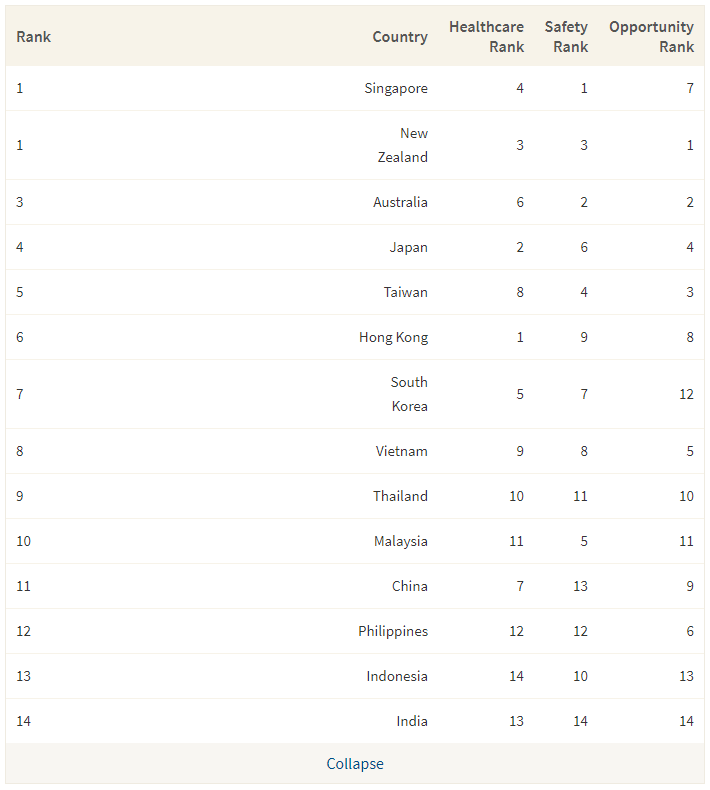Singapore is the least dangerous place for women to live in, according to a study done by research firm ValueChampion.
Tied with New Zealand
The city-state tied with New Zealand for the top spot.
The study, released in March this year, looked at 14 cities and countries in Asia Pacific.
Here are its rankings.
 Table via ValueChampion
Table via ValueChampion
While the study ranked Singapore higher than New Zealand in its healthcare (4th) and safety (3rd), the former fared worse for the opportunity indicator, taking the seventh spot while the latter ranked first.
 Table via ValueChampion
Table via ValueChampion
Indonesia, the Philippines and India were ranked the least safe for women.
Results of the study were also picked up by Asean's Facebook page, although four Asean countries were not included in the study -- Brunei Darussalam, Cambodia, Laos, and Myanmar.
Sexual harassment still a concern in Singapore
The study also noted some areas that Singapore can do better.
According to Anastassia Evlanova, an analyst at ValueChampion, although Singapore is generally safe for women, the 12 percent increase of outrage of modesty cases from 2017 to 2018 shows that sexual harassment is still a concern.
She raised the issue of Singapore's marital rape immunity law as well, saying it is "still only in the process of being repealed".
Singapore is currently set to repeal marital immunity for rape, which means that husbands would be deemed to have committed a crime should they force themselves on their wives.
How did the results come about?
The study made use of various sources to come up with its findings.
For instance, it used the Global Peace Index (GPI), the U.S. Department of State, and the United Nations Office on Drugs and Crime to come up with its conclusions on the safety indicator.
As for opportunity rankings, it referred to the World Bank and the United Nations Development Programme (UNDP) Human Development Index.
Limitations
1. Incomplete data
Evlanova said there were several limitations in the study which might have influenced the ranking.
For instance, the study had to resort to using China's ranking for Taiwan, a self-governed island, as the UNDP Human Development Index does not separate Taiwan from China due to the United Nations not recognising Taiwan as a sovereign state.
This might explain Taiwan's relatively lower ranking (7th) in healthcare as compared to China (8th).
The same goes for Hong Kong as well when it comes to ranking it for safety as the GPI does not separate Hong Kong from China.
Although the Special Administrative Region (SAR) has one of the lowest crime rates in the world, it was ranked lower than it should for safety, Evlanova said.
2. Under-reporting of crimes
In addition, Evlanova noted that due to the under-reporting of sexual harassment and domestic violence crimes in certain countries, the actual number of crimes committed against women on a daily basis could not be truly ascertained.
She then raised the example of Japan, saying that although it is one of the safest countries in Asia for women due to its great healthcare and low crime rates, it does not mean Japanese women "face the same level of safety as men" in everyday life.
About 95 percent of sexual assault cases in Japan go unreported.
She also recognised that official data does not paint the full picture, acknowledging that the feeling of safety is relative and differs from woman to woman.
Top image Annie Spratt/Unsplash
If you like what you read, follow us on Facebook, Instagram, Twitter and Telegram to get the latest updates.
